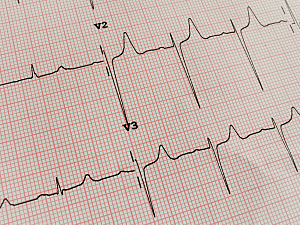Many patients who have an indication for renin–angiotensin–aldosterone system inhibitor (RAASi) therapy don’t receive it, according to multiple studies. Furthermore, patients on RAASi medication (angiotensin-converting enzyme inhibitor, angiotensin receptor blocker, or mineralocorticoid receptor antagonist) often don’t receive guideline-recommended doses.
Hyperkalemia is one of the most common adverse reactions to RAASi therapy and may be why patients have their dose reduced or discontinued altogether. Worryingly, researchers at Brigham and Women’s Hospital recently found in a population-based cohort study that patients who develop hyperkalemia while receiving RAASi therapy have a higher risk of poor outcomes.
Matthew Johnson, BA, former research fellow at the Brigham, Alexander Turchin, MD, MS, director of Quality in Diabetes in the Division of Endocrinology, Diabetes and Hypertension, and colleagues provide the details in the American Heart Journal.
Methods
The team retrospectively studied 82,732 adults (median age 66) treated with a RAASi by a primary care provider affiliated with Mass General Brigham between January 1, 2000, and December 31, 2017.
Any hyperkalemia occurring during the first 12 months of follow-up was classified as mild (5.1–5.5 mEq/L), moderate (5.6–6.0 mEq/L), or severe (>6.0 mEq/L). Ascertainment of clinical outcomes began at the end of that first 12 months and lasted until the patient died, the patient was lost to follow-up, or the study ended (on December 31, 2019).
Hyperkalemia and Clinical Outcomes
The primary outcome was a composite of the time to the first occurrence of any of the following:
- Persistent 50% reduction in estimated glomerular filtration rate (eGFR)
- Onset of persistent eGFR <15 mL/min/1.73 m2
- Initiation of renal replacement therapy
- Renal transplant
- Hospital admission for heart failure
- Myocardial infarction
- Stroke
- Death from any cause
The five-year cumulative risk of the primary outcome was higher in patients who did versus did not develop hyperkalemia during their first year of follow-up (64% vs. 37%; P<0.001).
In multivariable analysis, hyperkalemia during the first year of follow-up remained associated with a higher risk of the primary outcome (P<0.001 for all):
- Mild hyperkalemia—HR, 1.46
- Moderate hyperkalemia—HR, 1.73
- Severe hyperkalemia—HR, 2.29
- Overall—HR, 1.57
The increased risk was highly significant for every component of the primary outcome and every indication for RAASi therapy studied (diabetes with proteinuria, heart failure, coronary artery disease, and chronic kidney disease with proteinuria).
Hyperkalemia and Treatment Patterns
34% of patients who developed hyperkalemia de-intensified RAASi therapy (discontinued or had their dose reduced) compared with 29% of patients who did not develop hyperkalemia. The risk of RAASi de-intensification increased progressively and significantly with the severity of hyperkalemia.
Only 23% of patients with hyperkalemia received potassium-lowering medication.
RAASi Deintensification and Clinical Outcomes
In multivariable analysis, RAASi de-intensification was associated with increased risk of (P<0.001 for all):
- The primary outcome—HR, 1.28
- A renal component of the primary outcome—OR, 1.12
- Death—OR, 1.59
RAASi de-intensification was associated with a significantly increased risk of the primary outcome regardless of the indication for RAASi therapy.
Opportunities to Improve Care
It’s still unknown whether the relationship between hyperkalemia and adverse outcomes is causal. Still, it’s becoming clear hyperkalemia is a significant contributor to the already high burden of morbidity and healthcare costs carried by patients on RAASi therapy. Prevention of hyperkalemia should be a high priority in this vulnerable population, and patients who do develop hyperkalemia need close monitoring and aggressive treatment.
Options for the treatment of hyperkalemia that can help avoid deintensification of RAASi therapy include a low-potassium diet, diuretics, sodium-glucose transport protein 2 inhibitors, and potassium binders. Dietary modification may be advisable to prevent hyperkalemia in patients with established risk factors.
